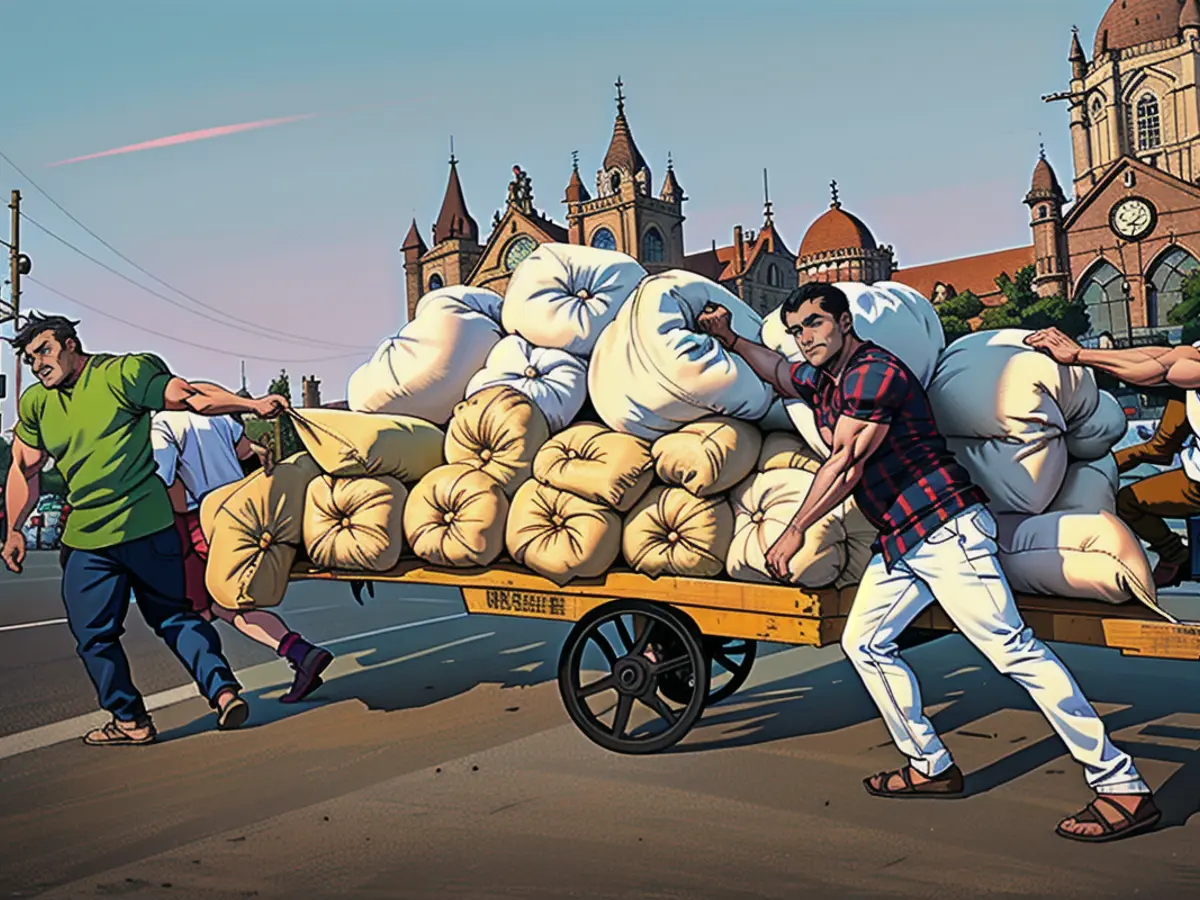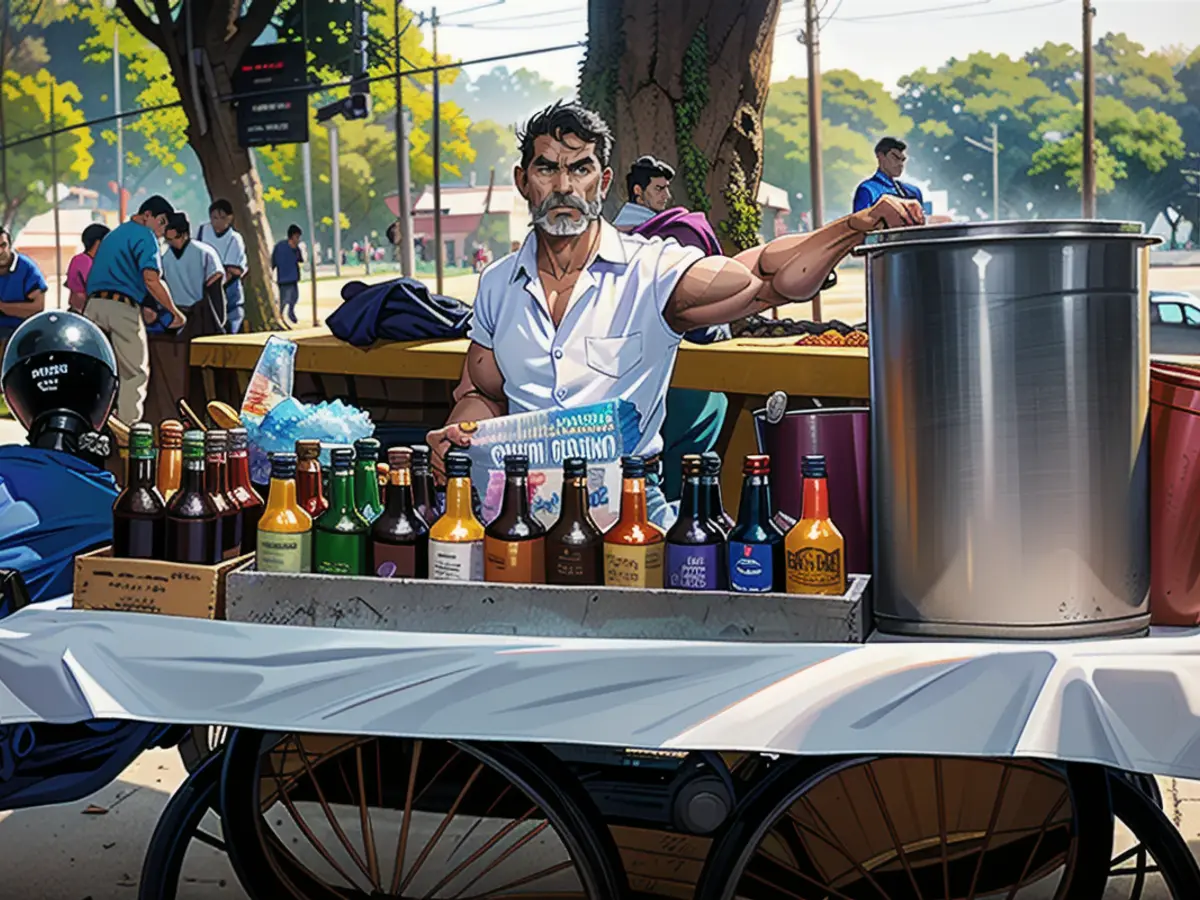In the largest voting event globally, millions of migrants are excluded from participating.
When polling stations open in the city, a 59-year-old street vendor from Mumbai won't be able to cast his vote in the nationwide election, along with millions of other internal migrant workers who make up a major part of the country's economy.
"I can't go and vote because I'm not from Maharashtra," Gupta told CNN in the Dadar shopping district, standing next to his cart where he sells shaved ice and cold drinks. "I have voting rights in another state."
Under Indian election rules, eligible voters can only vote in their constituencies, which means those working outside their state must travel back home to cast their ballot.
This is nearly impossible for many migrant workers, especially the underprivileged daily-wage workers in the unorganized sector. One study estimates there were around 600 million internal migrants in 2020, making up 43% of India's nearly 1.4 billion population.
These workers are often from poor rural parts of India, seeking work in large cities. Even then, they earn low wages that are sent back home to support their families.
Mumbai, India's wealthiest city and the birthplace of Bollywood, is home to many migrants from all over the country seeking wealth and success. More than 43% of Mumbai's population were classified as migrants in the last national census in 2011, and some come from states with high poverty and unemployment rates like Uttar Pradesh, Bihar, Rajasthan, and Gujarat.
The linguistic and cultural diversity is evident in Mumbai's many day laborers – from auto-rickshaw drivers to construction workers and sugarcane juice vendors.

For these workers, giving up daily wages to return home to vote would come at a significant cost – financially and in lost income. Their family members dependent on their earnings would suffer as well, from children missing tuition fees to elderly parents' rent and food costs.
The Covid-19 pandemic only exacerbated the precarious situation for migrant workers when millions lost their jobs suddenly and had to return home, leaving them vulnerable.
"Despite the high living expenses in large cities compared to villages, their wages are considerably low, leading to poor living conditions and limited or nonexistent public services such as water and sanitation," said one United Nations-led study.
Gupta's shaved ice business relies on the hot summer months when the election takes place. "If I go to vote, I'll lose my business," he said. "Taking care of my family is more important than voting."
"There are many others like me who work in Mumbai to earn money and can't vote."
Migrant workers abroad

Indians abroad, numbering 13.6 million and forming part of the large global Indian diaspora, face similar challenges, though their circumstances vary greatly.
Most are low-income laborers who helped build the economies and glittering cities of oil-rich Arab nations, while others are middle and upper-class students pursuing an international education or career in Western countries.
NRIs, as they are called, have no online voting or postal ballots — they must register as "overseas voters" and travel to their hometown in India to be physically present in their constituency.
Reports in the local media show some dedicated voters with the means to fly back and vote, like professionals in the UK or Dubai. However, they are a tiny minority of NRIs who do so.
According to the Election Commission of India, during the 2019 national elections, over 71,000 people registered as "overseas voters" – less than 1% of the total NRI population at the time.
Increasing voter turnout

Indian authorities have been working to increase voter turnout in recent years, urging all 968 million eligible voters nationwide to vote. Efforts include setting up over a million polling stations across the country, from remote forests to mountain peaks.
The Election Commission of India has also launched voter literacy initiatives and social media campaigns targeting young voters.
These efforts led to the highest voter turnout in Indian history in the 2019 elections, with more than 67% of the population casting their ballots.
However, the massive group of disenfranchised migrant workers stands in stark contrast to these achievements, with no solution on the horizon.
In a survey conducted in 2011, 60% of the workers from five Indian states claimed to have missed voting in elections at least once due to being away from home in search of better opportunities. The study also mentioned that some of these migrants began their journey as young as 13 years of age and couldn't manage to get their voter IDs even when they reached the eligible age of 18.
A 2022 report from the Election Commission of India (ECI) recognized this issue, questioning how to increase the voting participation of this group of internal migrants. However, the ECI faced a challenge, as there was no clear definition of an internal migrant. This uncertainty has been suggested to be one of the reasons leading to low voter turnout.
To tackle this, the ECI proposed the use of remote voting machines. But, in 2023, the government responded that there were no such plans in the works.
Consequently, for now, voting remains a distant dream for most migrant workers. "I can't say whose vote I would cast if I were back in my hometown," shares Gupta, a vendor from Mumbai. "My priority right now is to earn a living."
Read also:
- This will change in December
- Dikes withstand water masses so far - Scholz holds out the prospect of help
- Fireworks and parties ring in 2024 - turn of the year overshadowed by conflicts
- Attacks on ships in the Red Sea: shipping companies avoid important trade route
Even in the wealthiest city of Mumbai, where many migrants from various parts of India seek opportunities, internal migrant workers like 59-year-old Gupta face challenges in exercising their voting rights, given they can only vote in their constituencies according to Indian election rules.
Despite the fact that India has a large diaspora abroad, comprising 13.6 million individuals, those living outside the country also face difficulties in casting their votes, as they are required to travel back to their hometowns to be physically present in their constituencies.
Source: edition.cnn.com







